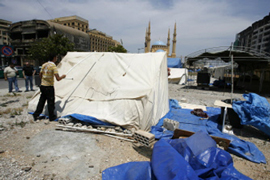Rival Lebanon leaders clinch deal
The accord will see the election of a president within 24 hours.

Sheikh Hamad bin Khalifa Al Thani, the Qatari emir, was at the Sheraton hotel in the early hours on Wednesday, working with the rival Lebanese groups on the final wording of the declaration.
Terms and conditions
According to Marwan Hamadeh, the Lebanese telecommunications minister, the opposition would get 11 seats in the cabinet, while 16 seats would go to the parliament majority, and the remaining three would be distributed by the elected president.
Previously, the opposition held six seats in the cabinet.
The deal is considered a victory for the opposition, which gained both its demands – veto power in a new national unity government, and an electoral law that divides Lebanon into smaller-sized districts, allowing for better representation of the country’s various factions.
However, Mohammed Raad, Hezbollah’s chief negotiator, downplayed the opposition’s gain, saying “neither side got all it demanded, but [the agreement] is a good balance between all parties’ demands”.
“Our diversity is what Lebanon is known for. We should not use this diversity as a tool for division.”
Siniora also said that the Arab league now has the task of “mending Syrian-Lebanese relations”.
Saad al-Hariri, the parliament majority leader, said he and his supporters “made this agreement, although we are deeply wounded”.
Nabih Berri, Lebanon’s parliament speaker and opposition stalwart, announced an immediate lifting of an 18-month-old sit-in by the opposition in Beirut, the Lebanese capital.
 |
| The tent city were part of protests calling for the resignation of Fouad Siniora [AFP] |
The protest began on December 1, 2006 when the opposition set up a sprawling tent city on streets leading to the offices of Fouad Siniora, the prime minister, in a bid to force him to step down.
Within an hour, trucks started clearing the tent city, which paralysed the commercial heart of Beirut for more than a year.
Large parts of the city centre were transformed into a ghost town as a result of the tent city forcing dozens of restaurants and businesses to shut down.
Berri said: “In the name of the opposition, I call for the end to the sit-in, in downtown Beirut.”
“This is the start of a good era, and it has started here in Qatar.”
Al Jazeera’s Zeina Khodr, in the Lebanese capital, said that a sense of relief had overcome those hoping to an end to the sit-in in Beirut.
Sceptical public
She said: “Projects that have been delayed can now be expected to move forward, and shop owners feel that they can get their businesses back on track.”
| Political deadlock |
 Background to Lebanon’s power vacuum Who’s who in Lebanese politics |
Al Jazeera’s James Bays, also reporting from Beirut, said that many Lebanese residents remain sceptical of the deal.
“Many of the people here want to know the full details of this agreement. They will also express their opnions once they know just what this agreement entails.”
“However, others also think that while a deal may have been reached in Doha, these politicians will start bickering over another issue once they get back.”